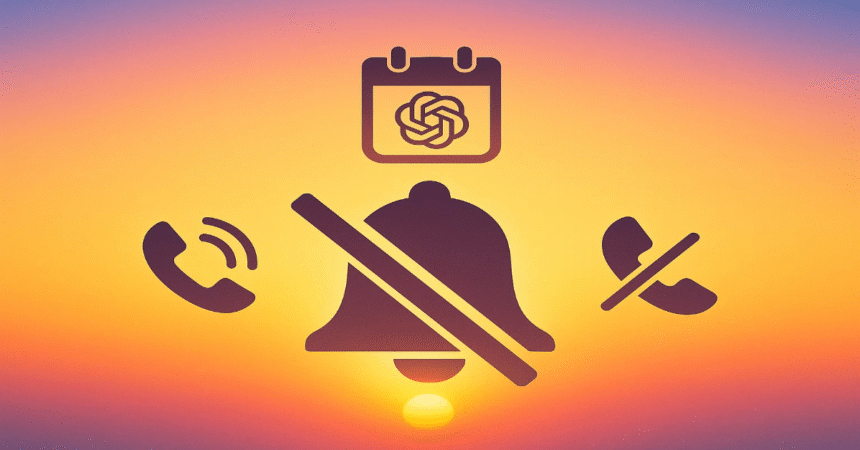When Calls Stopped Hijacking Mornings
ChatGPT wasn’t built to manage calendars, but that’s how one remote developer started using it. His mornings used to vanish into back-to-back calls, stand-ups, and check-ins that cloud software like Zoom or Teams kept pushing earlier. By the time he opened his code editor, focus was gone.
- When Calls Stopped Hijacking Mornings
- The Developer Whose Day Started in Chaos
- ChatGPT Redrew His Calendar Rules
- How GPT Helped Him Stick to It
- Why ChatGPT Beat Calendar Apps
- Chatronix: Where Structure Became Sustainable
- Bonus Prompt That Protected His Quiet Hours
- What Changed Beyond the Calendar
- Why This Story Matters
- Final Thought
The first time he asked ChatGPT to restructure his call schedule, mornings turned silent again. Work happened before interruptions, and productivity returned.
The Developer Whose Day Started in Chaos
He worked from home, but it felt like he lived at the office.
- Stand-ups at 8:30 a.m.
- Client syncs squeezed in at 9:15.
- Ad-hoc calls dropped on his calendar without warning.
By 11 a.m., his brain was fried. Actual development started after lunch, when energy was lowest. Deadlines slipped, and stress grew.
One evening, he typed into ChatGPT:
“Rebuild my calendar. Calls after 11 a.m., deep work before. Keep mornings quiet.”
ChatGPT Redrew His Calendar Rules
The response wasn’t just a list. It was a set of guardrails:
- 8:00–10:30: focus block, no meetings.
- 10:30–11:00: buffer for urgent syncs only.
- 11:00–2:00: scheduled calls and client updates.
- Afternoons: flexible slots for catch-ups.
He dropped the plan into Google Calendar. ChatGPT even generated polite responses to reschedule early-morning invites.
The next week, mornings stayed quiet for the first time in months.
How GPT Helped Him Stick to It
It became a routine. Each Sunday night, he prompted:
“Restructure my calendar this week. Protect mornings. Push all recurring calls after 11. Generate auto-reply emails for reschedules.”
ChatGPT drafted messages like:
“I reserve mornings for deep work. Can we shift to 11:30 or later?”
It wasn’t confrontation. It was structure. Most clients agreed.
After a month, he measured:
- 15+ hours of quiet focus gained monthly.
- 90% of calls shifted past 11.
- Deliverables shipped earlier than expected.
Why ChatGPT Beat Calendar Apps
Google Calendar, Outlook, even scheduling software couldn’t enforce boundaries. ChatGPT did, because it managed both time blocks and language.
| Tool | What It Did | What It Missed |
| Google Calendar | Schedule slots | No guardrails |
| Outlook | Reminders | Still reactive |
| Perplexity AI | Context for tasks | No scheduling logic |
| ChatGPT | Structured days + replies | Balanced deadlines |
The difference wasn’t automation. It was negotiation built into the workflow.
Chatronix: Where Structure Became Sustainable
From one model to six voices
He still used Claude for polished client emails, Gemini for quick research, and Perplexity AI for fact-checks. But bouncing between tabs killed momentum.
That’s when he moved to Explore Chatronix’s AI features.
Inside Chatronix, he got:
- Six models in one chat: GPT-5, ChatGPT, Claude, Gemini, Grok, Perplexity AI.
- 10 free queries to build and test scheduling stacks.
- Turbo mode with One Perfect Answer — merged six perspectives into one unified plan.
- Prompt stacks saved his “call rebalancer” routine.
- Side-by-side comparisons to refine scripts for client reschedules.
| Step | Old Way | With Chatronix |
| Weekly plan | Manual calendar edits | Turbo-generated schedule |
| Reschedule emails | Drafted by hand | Claude polish in 2 min |
| Task priorities | Guesswork | GPT + Gemini merged |
| Quiet hours | Constantly broken | Protected by stacks |
Instead of fighting for mornings, he automated them.
Bonus Prompt That Protected His Quiet Hours
Here’s the line he saved inside Chatronix Turbo:
“Restructure my week. Keep mornings 8–10:30 meeting-free. Push all recurring calls after 11. Generate polite auto-replies for reschedules.”
The output wasn’t just a plan—it was a system.
What Changed Beyond the Calendar
The visible results:
- Deadlines hit consistently.
- Coding hours happened when his brain was sharpest.
- Stress dropped from constant interruptions.
The invisible one? Mornings felt calm again. No scramble, no Slack pings pulling him into calls.
Why This Story Matters
Remote workers often treat mornings as negotiable. But in reality, they’re the only quiet hours left.
ChatGPT proved those hours could be protected with structure, not willpower. Chatronix turned it into a repeatable routine across six models.
The result wasn’t fewer calls. It was smarter ones.
ChatGPT Prompting Cheat-Sheet (Beginner to Master)
Bookmark for this later… pic.twitter.com/JVDQ32jx8V
— Zumer (@zumercreator) July 19, 2025Final Thought
He didn’t cancel meetings. He just stopped letting them hijack mornings.
With ChatGPT to organize and Chatronix to enforce, deep work finally happened before calls.
And once mornings stayed quiet, work stopped feeling like firefighting.
Because the real upgrade isn’t more meetings. It’s boundaries that stick.














